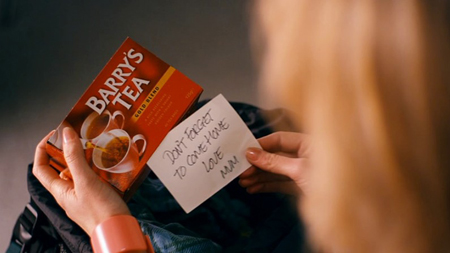BUYING IRISH – A CONSUMPTION FOR WHICH SHOPPERS SHOULD DEVOUTLY WISH? |
There was a time when an Irish government could sponsor a Buy Irish campaign, but not these days. Such moves are deemed to be at odds with the mathematical purity of the free market system. The fact that this kind of thinking was partly responsible for the financial mess we all have to endure doesn't appear to have sunk in but there's nothing to stop Irish firms getting together to promote themselves like the Love Irish Foods campaign John Fanning writes.
There are sound reasons for buying Irish food and drink brands, but we need to tread warily. For a start, there's the issue of what constitutes an Irish brand. Bushmills is an example of the difficulties involved. It was given legal licence in 1608, making it the world's oldest official distillery. Over the next 300 years it changed hands several times until it was eventually merged into the newly formed Irish Distillers group in 1972.
So it was an Irish brand for nearly 400 years. But in the 1980s, after Pernod Ricard's takeover of IDL, it became a French brand and shortly after that Diageo, which owns Guinness, bought the brand. So Bushmills is now British, despite most people in this country regarding it as ‘one of ours' on the grounds it is made on the island of Ireland
A Bord Bia survey confirms this view. Grocery shoppers were asked how they would define an Irish brand and 74 per cent pointed to a brand made in Ireland. It suggests Irish food and drink producers should make sure to flag their manufacturing location on their packs. They might even consider adding a cupla focail just to be sure to be sure.
 |
The survey also showed that the brands with the most impeccable Irish credentials are Tayto, Galtee, Flahavan's, Kilmeaden, Barry's Tea, Dairygold, Ballygowan and Guinness. But just because something looks Irish, sounds Irish and once was Irish is no guarantee that it still is; globalisation has muddied the waters, brands like Old Time Irish, Lyons Tea, Jacob's Fig Rolls and HB Ice Cream are not made here any more.
The main advantages consumers gave for buying Irish brands were attributes like security, safety, familiarity, family tradition and comfort as well as the more expected reasons of quality, taste and pride. It suggests Irish consumers are becoming more suspicious of the increasingly industrialised and globalised food system which churns out vast quantities of food at low monetary cost but with increasing health risks.
Because the survey was a repeat of one carried out in 2009 it is possible to track an increasing propensity to choose Irish brands. Three categories of grocery shopper were identified: loyal Irish band buyer; conditionally loyal and non-loyal brand buyers.
| 2009 | 2011 | |
|---|---|---|
| Loyal Irish brand buyers: Would buy Irish even if the price was more than 50c more expensive than imported brands |
19% | 18% |
| Conditionally loyal Irish brand buyers: Would buy if the price was 50c cheaper than imported brands |
53% | 67% |
| Non-loyal buyers: Make no distinction between Irish and imported brands |
29% | 15% |
The proportion of loyal buyers of Irish brands has remained pretty much static but there has been a marked increase in those prepared to consider the possibility if the price differential isn't too great and a corresponding drop in shoppers who ignore Irish brands.
The survey results confirm that the main reason for the growth in support is a growing identification of the correlation between buying Irish brands and job creation. Qualitative research carried out at the same time as the quantitative survey suggests that Irishness and Irish identity are highly emotional attributes for consumers as a result of the economic crisis and if leveraged properly could be a big driver for increased sales.
A disappointing feature of the survey results was that most of the ‘non-loyals' are younger, under 35, age groups less likely to make the connection between buying Irish and job creation. One of the main barriers to increased support for Irish brands is price. Some 65 per cent believe Irish brands are more expensive than imported brands. There is no basis for this other than the fact that most retailer own brands are cheap and could be sourced from anywhere. The share of retailer brands in the Irish grocery market now accounts for an alarming 36 per cent of total grocery sales. Irish brands must respond by making sure price differentials don't become too great and by reminding the public about broader, more sustainable definitions of value for money in an Irish context.
There are at least five good reasons for choosing Irish made brands wherever possible. Firstly, it is good for the economy; it creates jobs. Secondly, it is good for future growth and wealth creation because the more strong Irish brands we develop, brands which can ultimately hold their own in export markets, the more we protect ourselves from the vagaries of globalisation and the power of multinational businesses.
Thirdly, it is good for your health, consumers identify Irish brands as being more wholesome, more natural and less processed. Fourthly, it will be good for the planet; locally produced goods are more environmentally sustainable than jet-lagged stuff flown in from half way around the world. Fifthly and finally, it's good for the psyche.
In a global world the big institutions, the big retailers and the big multinationals have all the power and can walk all over the little guys who need to be strategic to survive. Buying Irish is a positive strategic move. It may not be as satisfying as having a riot outside the D









